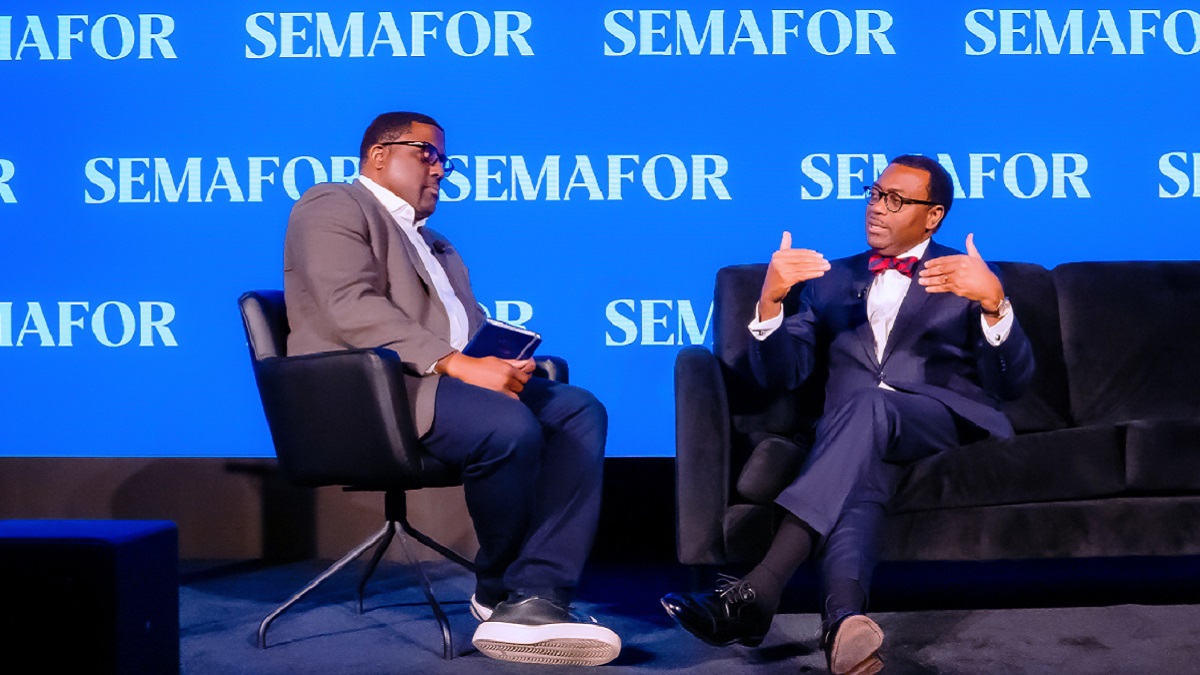The continent would pay $74 billion in debt service payments this year alone, a sharp increase from $17 billion in 2010
Também disponível em Português
WASHINGTON, D.C., United States of America, April 24, 2024/APO Group/ —
Africa’s immense economic potential is being undermined by non-transparent resource-backed loans that complicate debt resolution and compromise countries’ future growth, African Development Bank President Akinwumi Adesina (www.AfDB.org) said on Thursday.
“I think it’s time for us to have debt transparency accountability and make sure that this whole thing of these opaque natural resource-backed loans actually ends, because it complicates the debt issue and the debt resolution issue,” Adesina told journalist Yinka Adegoke at the Semafor Africa Summit taking place on the sidelines of the International Monetary Fund and World Bank2024 Spring Meetings.
Adesina highlighted the challenges posed by Africa’s ballooning external debt, which reached $824 billion in 2021, with countries dedicating 65% of their GDP to servicing these obligations. He said the continent would pay $74 billion in debt service payments this year alone, a sharp increase from $17 billion in 2010.
While acknowledging the fiscal pressures faced by African nations due to the Covid-19 pandemic, infrastructure needs, and rising inflation, Adesina emphasised the need to address the structural issues in Africa’s debt landscape. He pointed out the shift from concessional financing to more expensive and short-term commercial debt, with Eurobond debt now accounting for 44% of Africa’s total debt, up from 14-17% previously.
He also criticized the “Africa premium” that countries pay when accessing capital markets, despite data showing that Africa’s default rates are lower than those of other regions. He called for an end to this risk perception, which he said leads to higher borrowing costs for African nations.
The African Development Bank head stressed the importance of putting in place an orderly and predictable way of dealing with Africa’s debt, urging for faster implementation of the G20 Common Framework.
I think it’s time for us to have debt transparency accountability and make sure that this whole thing of these opaque natural resource-backed loans actually ends
He also highlighted the need for increased concessional financing, particularly for low-income countries. “What’s particularly interesting in Africa is that the level of concessional financing itself has actually gone down, has shrunk significantly,” he said, adding that the African Development Fund—the Bank Group’s concessional lending arm to low-income countries—is providing long-term financing at low interest rates to the 37 most vulnerable countries.
Adesina discussed various instruments and initiatives employed by the African Development Bank to de-risk projects and attract institutional investors, such as partial credit guarantees, hybrid capital, and synthetic securitisation.
Looking ahead, Adesina expressed optimism about the opportunities in Africa, particularly in renewable energy, given the continent’s vast solar potential. He also highlighted the Africa Investment Forum, a platform created by the Bank and its partners, that brings together investors from around the world to facilitate large-scale investments in key sectors like infrastructure, digital, and renewable energy.
“Africa is the best investment destination in the world,” Adesina concluded, emphasizing the African Development Bank’s commitment to creating an enabling environment for investments to thrive.
The Semafor summit session —titled “Rising Global Middle Class: Is Rising Developing Nation Debt a Blessing or a Curse?”—brought together a range of participants for conversations on the increasing debt burden faced by developing countries as borrowing costs have risen.
Other notable participants included Xavier Becerra, U.S. Secretary of Health and Human Services; Raj Shah, President of the Rockefeller Foundation; Andrew Steer, President and CEO of the Bezos Earth Fund; and Brent Neiman Assistant Secretary for International Finance, U.S. Treasury.
Shah emphasised the importance of balancing developing countries economic needs with the need for climate action. He said that to assist the South African government in efforts to decommission the country’s coal-fired Komati power station, the Rockefeller Foundation, through the Global Energy Alliance for People and Planet, had developed a plan that would retrain workers at the plant while also creating new jobs and upgrading transmission infrastructure so that renewable energy could empower local businesses. “It’s an unrealistic conversation to just ask people to shut down their only real source of prosperity and cause job losses,” Shah said.
Neiman addressed the U.S government’s efforts to assist African countries in reducing debt loads. He noted that Côte d’Ivoire, Benin, and Kenya, had issued almost $5 billion in bonds since the beginning of 2024, at interest rates ranging from 8 to 10 percent. He said this was evidence that emerging economies remain able to tap capital markets. He also cited the Global Sovereign Debt Roundtable as instrumental in bringing together creditors and debtors to tackle rising debt burdens in developing countries.
Adesina is in Washington to attend the 2024 International Monetary Fund/World Bank Spring Meetings.
Distributed by APO Group on behalf of African Development Bank Group (AfDB).
